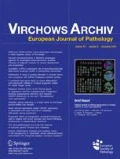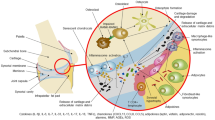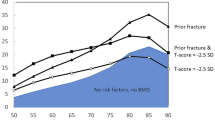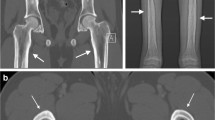Abstract
Erosion of the bone is a common problem in patients suffering from infected osteoradionecrosis (IORN) or bisphosphonate-associated osteonecrosis (BON). Besides inflammatory mechanisms and infectious agents, osteoclasts were recently suggested to be specifically involved in the osteolytic mechanisms. We therefore investigated the immunohistochemical labeling of the cysteine proteinase cathepsin K, which plays a central role in osteoclast-mediated bone resorption, in tissue specimens of patients with BON (n=9; four male, five female; mean age=69.2 years) and IORN (n=10; nine male, one female; mean age=60.5 years), and compared the results with control specimens (n=8; six male, two female; mean age=60 years). In all cases, osteoclasts were the predominant cell type expressing cathepsin K. For semiquantitative analysis, we therefore defined osteoclasts as multinuclear giant cells attached to the bone and expressing cathepsin K. Significantly higher numbers of osteoclasts were found for both types of osteonecrosis when compared with the control group (BON+IORN vs controls: P=0.0000036). Within the pathological lesions, IORN cases exhibited significantly less osteoclasts than BON (P=0.00097). Our study verified increased numbers of osteoclasts in patients suffering from BON and IORN. Although it is known that bisphosphonates (and to a lesser extent, irradiation, too) decrease osteoclast function, these findings suggest a critical involvement of osteoclasts in the mechanisms of bone destruction in the respective lesions.



Similar content being viewed by others
References
Abu-Id MH, Acil Y, Gottschalk J, Kreusch T (2006) Bisphosphonate-associated osteonecrosis of the jaw. Mund Kiefer Gesichtschir 10:72–81
Aitasalo K (1986) Bone tissue response to irradiation and treatment model of mandibular irradiation injury. Acta Otolaryngol Suppl 428:1–54
Altundal H, Güvener Ö (2004) The effect of alendronate on resorption of the alveolar bone following tooth extraction. Int J Oral Maxillofac Surg 33:286–293
Andrews N, Griffiths C (2001) Dental complications of head and neck radiotherapy: part 1. Aust Dent J 46:88–94
Bagan JV, Murillo J, Jimenez Y, Poveda R, Milian MA, Sanchis JM, Silvestre FJ, Scully C (2005) Avascular jaw osteonecrosis in association with cancer chemotherapy: series of 10 cases. J Oral Pathol Med 34:120–123
Bamias A, Kastritis E, Bamia C, Moulopoulos LA, Melakopulos I, Bozas G, Koutsoukou V, Gika D, Anagnostopoulos A, Papadimitriou C, Terpos E, Dimopoulos MA (2005) Osteonecrosis of the jaw in cancer after treatment with bisphosphonates: incidence and risk factors. J Clin Oncol 34:8580–8587
Curi MM, Dib LL, Kowalski LP, Landman G, Mangini C (2000) Opportunistic actinomycosis of the jaws in patients affected by head and neck cancer: incidence and clinical significance. Oral Oncol 36:294–299
Garant PR (1976) Light and electron microscopic observations of osteoclastic alveolar bone resorption in rats monoinfected with Actinomyces naeslundii. J Periodontol 47:717–723
Garlet GP, Cardoso CR, Silva TA, Ferreira BR, Ávilla-Campos MJ, Cunha FQ, Silva JS (2006) Cytokine pattern determines the progression of experimental periodontal disease induced by Actinobacillus actinomycetemcomitans through the modulation of MMPs, RANKL, and their physiological inhibitors. Oral Microbiol Immunol 21:12–20
Glanzmann C, Grätz KW (1995) Radionecrosis of the mandibula: a retrospective analysis of the incidence and risk factors. Radiother Oncol 36:94–100
Hansen T, Otto M, Gaumann A, Eckardt A, Petrow PK, Delank KS, Kirkpatrick CJ, Kriegsmann J (2001) Cathepsin K in aseptic hip prosthesis loosening: expression in osteoclasts without polyethylene wear particles. J Rheumatol 28:1615–1619
Hansen T, Unger RE, Gaumann A, Hundorf I, Maurer J, Kirkpatrick CJ, Kriegsmann J (2001) Expression of matrix-degrading cysteine proteinase cathepsin K in cholesteatoma. Mod Pathol 14:1226–1231
Hansen T, Kunkel M, Kirkpatrick CJ, Weber A (2006) Actinomyces in infected osteoradionecrosis—underestimated? Hum Pathol 37:61–67
Hansen T, Kunkel M, Weber A, Kirkpatrick CJ (2006) Osteonecrosis of the jaws in patients treated with bisphosphonates—histomorphologic analysis in comparison with infected osteoradionecrosis. J Oral Pathol Med 35:155–160
Happonen RP, Viander M, Pelliniemi L, Aitasalo K (1983) Actinomyces israelii in osteoradionecrosis of the jaws. Oral Surg Oral Med Oral Pathol 55:580–588
Henderson B, Nair SP, Ward JM, Wilson M (2003) Molecular pathogenicity of the oral opportunistic pathogen Actinobacillus actinomycetemcomitans. Annu Rev Microbiol 57:29–55
Kataoka M, Torisu T, Tsumura H, Hirayama T, Fujikawa Y (2000) Role of multinuclear cells in granulation tissue in osteomyelitis. Acta Orthop Scand 71:414–418
Littlewood-Evans A, Kokubo T, Ishibashi O, Inaoka T, Wlodarski B, Gallagher JA, Bilbe G (1997) Localization of cathepsin K in human osteoclasts by in situ hybridization and immunohistochemistry. Bone 20:81–86
Lugassy G, Shaham R, Nemets A, Ben-Dor D, Nahlieli O (2004) Severe osteomyelitis of the jaw in long-term survivors of multiple myeloma: a new clinical entity. Am J Med 117:440–441
Mann HB, Whitney DR (1947) On a test whether one or two random variables is stochastically larger than the other. Ann Math Stat 18:50
Marx RE (2003) Pamidronate (Aredia) and Zoledronate (Zometa) induced avascular necrosis of the jaws: a growing epidemic. J Oral Maxillofac Surg 61:1115–1118
Marx RE, Sawatari Y, Fortin M, Broumand V (2005) Bisphosphonate-induced exposed bone (osteonecrosis/osteopetrosis) of the jaws: risk factors, recognition, prevention, and treatment. J Oral Maxillofac Surg 63:1567–1575
Millett DT, Chapple IL, Hirschmann PN, Corrigan AM (1990) Septic osteoradionecrosis of the mandible associated with pathological fracture: report of two cases. Clin Radiol 41:408–410
Nishida E, Hara Y, Kaneko T, Ikedo Y, Ukai T, Kato I (2001) Bone resorption and local interleukin-1α and interleukin-1β synthesis induced by Actinobacillus actinomycetemcomitans and Porphyromonas gingivalis lipopolysaccharide. J Periodontal Res 36:1–8
Reszka AA, Halasy-Nagy J, Rodan GA (2001) Nitrogen-bisphosphonates block retinoblastoma phosphorylation and cell growth by inhibiting the cholesterol biosynthesis pathway in a keratinocyte model for esophageal irritation. Mol Pharmacol 59:193–202
Rogers MJ, Gordon S, Benford HL, Coxon FP, Luckman SP, Monkkonen J, Frith JC (2000) Cellular and molecular mechanisms of action of bisphosphonates. Cancer 88:2961–2978
Roodman GD (1999) Cell biology of the osteoclast. Exp Hematol 27:1229–1241
Ruggiero S, Mehrotra B, Rosenberg T, Engroff S (2004) Osteonecrosis of the jaws associated with the use of bisphosphonates: a review of 63 cases. J Oral Maxillofac Surg 62:527–534
Scheven BA, Wassenaar AM, Kawiralang-de Haas EW, Nijweide PJ (1987) Direct and indirect radiation effects on osteoclast formation in vitro. Bone Miner 2:291–300
Støre G, Boysen M (2000) Mandibular osteoradionecrosis: clinical behaviour and diagnostic aspects. Clin Otolaryngol 25:378–384
Støre G, Eribe ERK, Olsen I (2005) DNA–DNA hybridization demonstrates multiple bacteria in osteoradionecrosis. Int J Oral Maxillofac Surg 34:193–196
Thiel HJ (1989) The osteoradionecrosis. Part I: etiology, pathogenesis, clinic, and risk factors. Radiobiol Radiother 30:397–413
Thompson K, Dunford JE, Ebetino FH, Rogers MJ (2002) Identification of a bisphosphonate that inhibits isopentenyl diphosphate isomerase and farnesyl diphosphate synthase. Biochem Biophys Res Commun 290:869–873
Väänänen K (2005) Mechanism of osteoclast mediated bone resorption—rationale for the design of new therapeutics. Adv Drug Deliv Rev 57:959–971
Van Driessche K, van Ranst D, van Offel J, Stevens WJ, De Schepper A, van Marck E, De Clerck LS (2003) Actinomycosis as a rare cause of vertebral osteolysis. Acta Clin Belg 58:296–298
Yamaza T, Goto T, Kamiya T, Kobayashi Y, Sakai H, Tanaka T (1998) Study of immunoelectron microscopic localization of cathepsin K in osteoclasts and other bone cells in the mouse femur. Bone 23:499–509
Yamaza T, Tsuji Y, Goto T, Kido MA, Nishijima K, Moroi R, Akamine A, Tanaka T (2001) Comparison in localization between cystatin C and cathepsin K in osteoclasts and other cells in mouse tibia epiphysis by immunolight and immunoelectron microscopy. Bone 29:42–53
Acknowledgments
The authors thank Irmtrud Roth and Silke Mitschke, Institute of Pathology, University of Mainz, for their excellent technical assistance.
Author information
Authors and Affiliations
Corresponding author
Rights and permissions
About this article
Cite this article
Hansen, T., Kirkpatrick, C.J., Walter, C. et al. Increased numbers of osteoclasts expressing cysteine proteinase cathepsin K in patients with infected osteoradionecrosis and bisphosphonate-associated osteonecrosis—a paradoxical observation?. Virchows Arch 449, 448–454 (2006). https://doi.org/10.1007/s00428-006-0261-y
Received:
Accepted:
Published:
Issue Date:
DOI: https://doi.org/10.1007/s00428-006-0261-y




